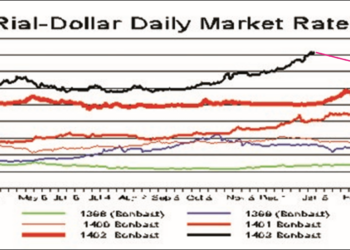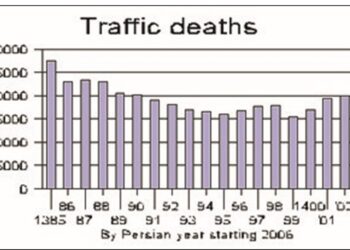September 20-2013
NITC, Iran’s biggest tanker company, has increased the capacity of its supertanker fleet by 23 percent this year, making it easier for Iran to deliver crude to foreign buyers who cannot hire non-Iranian tankers to carry Iranian oil because of sanctions.
But despite sanctions, Iran appears to have itself leased a small foreign tanker from a Swedish firm to quietly make deliveries of Iranian refined products to Iranian ports.
NITC, formerly called the National Iranian Tanker Company, this year has added seven new very large crude carriers (VLCCs), each able to transport 2 million barrels of oil, according to data from IHS Maritime, an England-based research company that provides data to the United Nations’ shipping agency. NITC now has 37 supertankers and its entire fleet can hold about 86 million barrels of oil, equal to 78 days of Iran’s oil exports.
“Any addition of new tonnage gives NITC the ability to deliver more crude direct to their customers on their own ships, avoiding insurance difficulties,” Nigel Prentis, the head of consultancy at Hartland Shipping Services Ltd., a London-based shipbroker, told Bloomberg news. “It also allows them to store more crude at sea.”
Three of the VLCCs were built at the Waigaoqiao shipyard in Shanghai, while the remaining four were made in Dalian, northern China. The supertankers were part of a group of 12 vessels ordered in August 2009, for which the total contract price was $1.2 billion.
Iran didn’t add to its fleet of smaller Suezmax or Aframax vessels this year, according to IHS data.
But despite the 23 percent expansion of its supertanker carrying capacity this year, Iran still has a need for some other tankers.
A Swedish shipping company currently operates a tanker that has been exclusively making stops at Iranian oil ports, according to several months of ship tracking data provided to the Washington Free Beacon by United Against Nuclear Iran (UANI), a watchdog group.
Sweden’s Stockholm Chartering AB controls the ship that appears to exclusively run routes along Iran’s southern coast in the Persian Gulf. Such deliveries would constitute a violation of US and European sanction on Iran, according to UANI, which constantly pressures American and European companies to cut ties with Tehran.
The ship, Persia, was spotted over the past two months docking near several Iranian ports. UANI has petitioned the company to halt its deliveries and has alerted the European Union, of which Sweden is a member, to its potentially illegal dealings.
The Persia appears to be one of the most active non-Iranian vessels frequenting Iran’s docks at Bandar Imam Khomeini, Lavan Island and the port of Chabahar.
The Persia is a product tanker, rather than a crude oil ship, which are much larger. The Persia is insured by Iran’s in-house insurance company.
Stockholm Chartering clearly isn’t hiding its relationship with Iran. The company features photographs of Iranian tankers on its website.
UANI said Stockholm’s activities could constitute a major violation of European Union sanctions on Iran. In 2012, the EU prohibited EU entities “to transport crude oil or petroleum products if they originate in Iran.”
UANI’s actions against Stockholm are part of a larger campaign to publicly shame companies that continue to do business with Iran.














